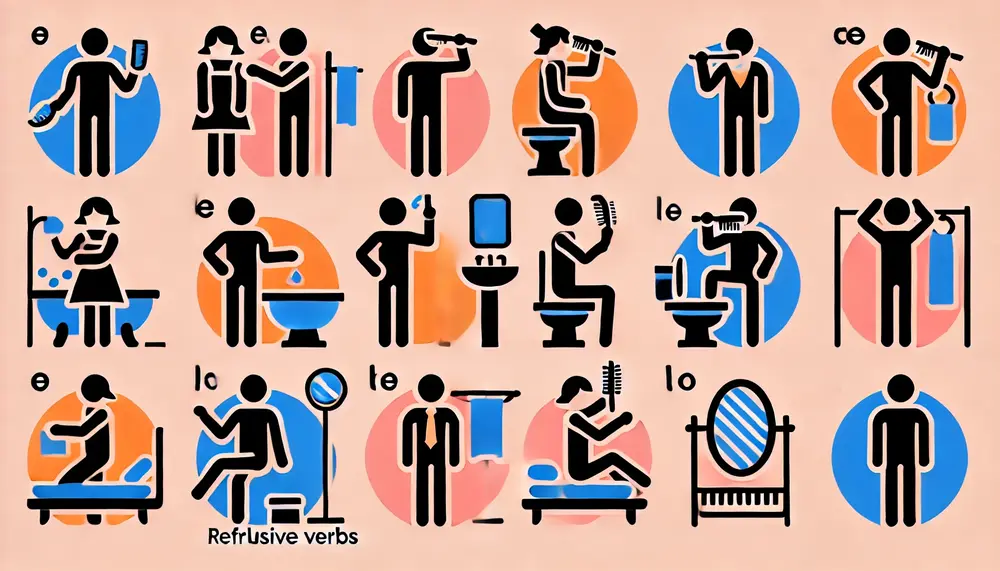Bosque de Palabras
Bosque de Palabras is a text adventure survival game designed to help you learn Spanish vocabulary and grammar while having fun!
In Bosque de Palabras, you're camping️ in the middle of a dark forest, with only a few pieces of food left and a campfire keeping you warm. Every choice you make is important for your survival.
Perfect for: Novice and Intermediate level Spanish learners.
Quick Guide to Reflexive Verbs in Spanish
Gordon Feliz • Updated July 2nd, 2024


Apprendre en français

Aprender em Português
What Are Reflexive Verbs?
Reflexive verbs are verbs where the subject and the object of the sentence are the same. In other words, the action of the verb reflects back on the person performing it. You can spot a reflexive verb because it comes with a reflexive pronoun. In Spanish, these pronouns are: me, te, se, nos, os, and se.
Reflexive Pronouns
Here’s a quick breakdown of reflexive pronouns in Spanish:
- Me (myself)
- Te (yourself, informal)
- Se (himself, herself, yourself formal, themselves, yourselves formal)
- Nos (ourselves)
- Os (yourselves, informal plural in Spain)
Conjugating Reflexive Verbs
Let’s start with a simple reflexive verb: lavarse (to wash oneself). Here’s how you conjugate it:
- Yo me lavo (I wash myself)
- Tú te lavas (You wash yourself, informal)
- Él/Ella/Usted se lava (He/She/You wash(es) himself/herself/yourself)
- Nosotros/Nosotras nos lavamos (We wash ourselves)
- Vosotros/Vosotras os laváis (You all wash yourselves, informal plural in Spain)
- Ellos/Ellas/Ustedes se lavan (They/You all wash themselves/yourselves)

Common Reflexive Verbs
Here are some common reflexive verbs you’ll encounter frequently:
- Despertarse (to wake up)
- Vestirse (to get dressed)
- Acostarse (to go to bed)
- Ducharse (to take a shower)
- Sentirse (to feel)
Spanish | English |
Yo me despierto a las siete. | I wake up at seven. |
Tú te vistes rápidamente. | You get dressed quickly. |
Ella se acuesta temprano. | She goes to bed early. |
Nosotros nos duchamos después de correr. | We shower after running. |
¿Cómo te sientes hoy? | How do you feel today? |
Using Reflexive Verbs in Different Tenses
Reflexive verbs can be used in any tense. Let’s see how despertarse (to wake up) looks in the present, past, and future tenses:
Present Tense
- Me despierto a las seis. (I wake up at six.)
Preterite Tense
- Me desperté a las seis ayer. (I woke up at six yesterday.)
Future Tense
- Me despertaré a las seis mañana. (I will wake up at six tomorrow.)
Reflexive vs. Non-Reflexive Verbs
Some verbs can be reflexive or non-reflexive, depending on whether the action is performed on oneself or someone else. For example, lavar (to wash) vs. lavarse (to wash oneself):
Non-Reflexive:
Lavo el coche. (I wash the car.)
Reflexive:
Me lavo las manos. (I wash my hands.)
Reflexive Verbs with Body Parts and Clothing
When talking about body parts and clothing, reflexive verbs are often used along with definite articles (el, la, los, las) instead of possessive adjectives (mi, tu, su). For example:
Peinarse (to comb oneself)
Me peino el pelo. (I comb my hair.)
Ponerse (to put on)
Nos ponemos los abrigos. (We put on our coats.)
Language Learning Exercises: Reflexive Verbs
- Me despierto a las seis. (I wake up at six.)
- Te duchas todos los días. (You shower every day.)
- Se cepilla los dientes después de comer. (He/She brushes his/her teeth after eating.)
- Nos levantamos temprano. (We get up early.)
- Os peináis el pelo. (You all comb your hair.)
Conjugating Reflexive Verbs Exercises
-
Yo me visto rápidamente. (I get dressed quickly.)
-
Tú te acuestas tarde. (You go to bed late.)
-
Él se afeita todas las mañanas. (He shaves every morning.)
-
Nosotros nos relajamos los fines de semana. (We relax on weekends.)
-
Ellos se lavan las manos antes de comer. (They wash their hands before eating.)
Common Reflexive Verbs Exercises
- Me siento cansado hoy. (I feel tired today.)
- Te ves bien con ese vestido. (You look good in that dress.)
- Se enoja fácilmente. (He/She gets angry easily.)
- Nos divertimos en la fiesta. (We had fun at the party.)
- Se quejan del trabajo. (They complain about the job.)
Reflexive Verbs in Different Tenses Exercises
-
Me acosté tarde anoche. (I went to bed late last night.)
- Te despertarás temprano mañana. (You will wake up early tomorrow.)
- Se bañó antes de la cena. (He/She bathed before dinner.)
-
Nos levantaremos a las siete. (We will get up at seven.)
- Se vistieron rápidamente. (They got dressed quickly.)
Reflexive Verbs with Body Parts and Clothing Exercises
- Me cepillo el pelo. (I brush my hair.)
- Te lavas la cara. (You wash your face.)
- Se pone los zapatos. (He/She puts on his/her shoes.)
-
Nos cortamos las uñas. (We cut our nails.)
- Os laváis los pies. (You all wash your feet.)
Practicing Reflexive Verbs Exercises
- Me ducho después de hacer ejercicio. (I shower after exercising.)
-
Te peinas antes de salir. (You comb your hair before going out.)
-
Se duerme en el sofá. (He/She falls asleep on the couch.)
- Nos vestimos rápidamente por la mañana. (We get dressed quickly in the morning.)
- Se sientan a desayunar juntos. (They sit down to have breakfast together.)
Additional Resources To Learn More About Reflexive Verbs
To deepen your understanding of Spanish grammar and usage, check out these helpful articles:
Spanish Verbs That Change Meaning When Reflexive
This article explains how certain Spanish verbs can change their meaning when used reflexively. It provides examples and contexts to help you understand these nuances, making your Spanish more natural and accurate.
How to Use Direct and Indirect Object Pronouns in Spanish
Learn the differences between direct and indirect object pronouns in Spanish and how to use them correctly. This guide includes plenty of examples to help you master these essential components of Spanish grammar.
Beginner's Guide to Spanish Sentence Structure With Examples
If you're starting with Spanish, this guide will help you understand the basic sentence structure. It includes clear examples and explanations to build a strong foundation in forming sentences correctly.
Reflexive Verbs in Spanish: A Comprehensive Guide
This guide offers a detailed explanation of reflexive verbs, including common examples and how they are used in everyday Spanish. It covers different types of reflexive verbs and provides practical sentences to help you grasp their usage effectively.
